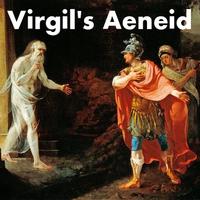Aeneid: Book I, 1-33
Énéide|Livre I|
Arms and man|Book I|I
アエネーイス||
Aeneis: Buch I, 1-33
Aeneid: Book I, 1-33
Eneida: Libro I, 1-33
Énéide : Livre I, 1-33
Eneida: Livro I, 1-33
Arma virumque canō, Trojae quī prīmus ab ōrīs
les armes|||||||des côtes
"Arms" or "Weapons"|"and the man"|I sing of|of Troy|who first|first|"from"|"from the shores"
Waffen|und den Mann|singt|||||
|||||最初の||
Ich singe von Waffen und dem Mann, der als Erster von den Küsten Trojas
I sing of arms and a man, who first from the shores of Troy
Italiam fātō profugus Lavinaque vēnit
|destiny||et Lavinium|
"to Italy"|by fate|"exiled by fate"|and Lavinian shores|"he came"
||||kam
vom Schicksal vertrieben nach Italien und den Ufern Lavinias kam,
exiled by fate, came to Italy and Lavinian shores
lītora — multum ille et terrīs jactātus et altō
||||Ländern|||
"shores" or "coasts"|"much" or "greatly"|"that man"||lands|tossed about much|and|the deep sea
|||||jeté||
costas, margens, praias|muito|aquele|e|terras e mares|lançado|e|alto-mar
vielseitig, von den Länden und dem hohen Meer geworfen.
shores - much tossed about both to the earth and the deep (sea).
vī superum, saevae memorem Jūnōnis ob īram,
|des cieux|de la furie||||
der Weg|der Götter|wütenden|erinnernd||wegen|Zorn
"by the force"|"of the gods"|fierce|mindful of|"of Juno"|"on account of"|"wrath" or "anger"
pela força|dos deuses superiores|ira cruel de|rancor persistente|de Juno|devido à|ira
by the force (power) from above (gods), mindful of Juno's savage anger.
multa quoque et bellō passus, dum conderet urbem
||||erlebte||gründete|Stadt
many things|"also" or "as well"||"in war"|suffered|"while"|"might found"|the city
muitas coisas|também|e também|guerra|sofrimentos|enquanto|fundasse|
he suffered many things and also in war, while he was founding the city.
Ele também sofreu muito na guerra enquanto construía a cidade.
īnferretque deōs Latiō — genus unde Latīnum
und brachte|||||
"and bring in"|"the gods"|to Latium|race|from which|Latin people
and brought (carried) his gods to Latium - from the kind from which the Latin people came,
Albānīque patrēs atque altaue moenia Rōmae.
|||hohe||
"Alban fathers"|"Alban fathers"|and also|high walls of|walls of Rome|of high Rome
The ancestors of Alba Longa and the high walls of noble Rome.
Mūsa, mihī causās memorā, quō nūmine laesō
Muse|mir|Ursachen|erinnere|||verletzt
Muse|"to me"|"the reasons"|"Recall" or "relate"|by what divine power|divine will|offended
Muse, tell (recall) to me the cause, how was her divinity offended
quidve dolēns rēgīna deum tot volvere cāsūs
oder||||||
"or what"|grieving|queen of gods|"of the gods"|so many|"to endure"|"misfortunes" or "hardships"
What grieving for the queen of the gods to wish to overthrow
īnsignem pietāte virum, tot adīre labōrēs
|Frömmigkeit|Mann|||
"notable"|"devotion" or "sense of duty"|"man" or "hero"|so many|to endure|toils
A man of outstanding piety, to endure (undergo) so many trials
impulerit.
er wird (ver)anlasen
"has driven"
to push.
Tantaene animīs caelestibus īrae?
so große|Seelen|himmlischen|Zorn
So great|minds|heavenly|wrath
Can there be such anger in the minds of the gods?
Urbs antīqua fuit (Tyriī tenuēre colōnī)
||||hatten|Kolonisten
The city|ancient|was|Tyrian colonists|held by|colonists from Tyre
There was an ancient city, ((which) Tyrian colonists held)
Karthāgō, Ītaliam contrā Tiberīnaque longē
Carthage, against Italy|Italy|opposite|Tiber and|"far from"
Carthage, opposite Italy and the far off mouth (Harbors) of the Tiber
ōstia, dīves opum studiīsque asperrima bellī,
Ostia|reich|Reichtum||sehr rau|Krieg
harbors|"rich" or "wealthy"|"of resources"|"and pursuits"|most fierce in|of war
Rich in wealth, and very savage in pursuit of war
quam Jūnō fertur terrīs magis omnibus ūnam
than|Juno|"is said"|to the lands|more||one
||verheven||||
It is reported that Juno loved this land more than all the others
posthabitā coluisse Samō, hīc illius arma,
"neglected"|"cherished"|Samos Island|here|of that|
Even neglecting the cherished Samos, here were her weapons
hīc currus fuit; hoc rēgnum dea gentibus esse,
here|chariot|was|this|kingdom|goddess|"nations" or "peoples"|to be
This was her chariot, that this kingdom to be supreme over nations
sī quā fāta sinant, iam tum tenditque fovetque.
"if"|if anywhere|fates permit|"allow" or "permit"|now|then|"aims" or "strives"|"and cherishes"
if the fates allow, she now then both aims and cherishes.
Prōgeniem sed enim Troiānō ā sanguine dūcī
"Offspring" or "descendant"|but|for|Trojan|from|bloodline|"to be led"
But just draw the offspring from the blood of the Trojanus
audierat Tyriās ōlim quae verteret arcēs;
"had heard"|Tyrian|once|which|"would overthrow"|strongholds
he had heard some time before the Tyrians which turned their citadels;
hinc populum lātē rēgem bellōque superbum
from here|the people|widely|king|and war|proud
hence the people of a wide and formidable and proud king
ventūrum excidiō Libyae; sīc volvere Parcās.
coming|destruction of|of Libya|thus|to roll|Fates
the destruction of Libya will come; thus the Spartans are rolling.
Id metuēns veterisque memor Sāturnia bellī,
Id|fearing|of the old|mindful|of Saturn|
Fearing for this, he remembered the old Saturn wars;
prīma quod ad Troiam prō cārīs gesserat Argīs —
first|||Troy|for|dear ones|had done|the Argives
first what he had done to Troy at Argos for dear friends
necdum etiam causae īrārum saevīque dolōrēs
but also|even|causes|of the angers|and fierce|pains
not even the causes of angry and severe pain
exciderant animō; manet altā mente repostum
had fallen|spirit|remains|high|mind|stored away
they had fallen from their minds; remains stored in a deep mind
iūdicium Paradis sprētaeque iniūria formae,
judgment|Paradise|rejected and|injustice|of the form
the trial of Paradis, beyond the wrong form,
et genus invīsum, et raptī Ganymēdis honōrēs:
|race|hated||the abducted|of Ganymede|honors
an unpopular race, and the honor of Ganymede raped:
hīs accēnsa super iactātōs aequore tōtō
by these|having been set on fire|upon|tossed|the sea|the whole
fired upon those tossed on the surface of the sea
Trōas, reliquiās Danaum atque immītis Achillī,
Troy|the relics|of the Greeks|and|fierce Achilles|Achilles
The Trojans, the remains of the Greeks and the cruel Achilles,
arcēbat longē Latiō, multōsque per annōs
was keeping away||Latium|many|through|years
Latium kept them a long way off, and for many years
errābant, āctī fātīs, maria omnia circum.
they were wandering|driven by fate|fates|seas|all|around
They were wandering around the seas, as fates have done.
Tantae mōlis erat Rōmānām condere gentem!
So great|great effort|was|Roman|found|race
Of so great a task it was to found the Roman nation!

